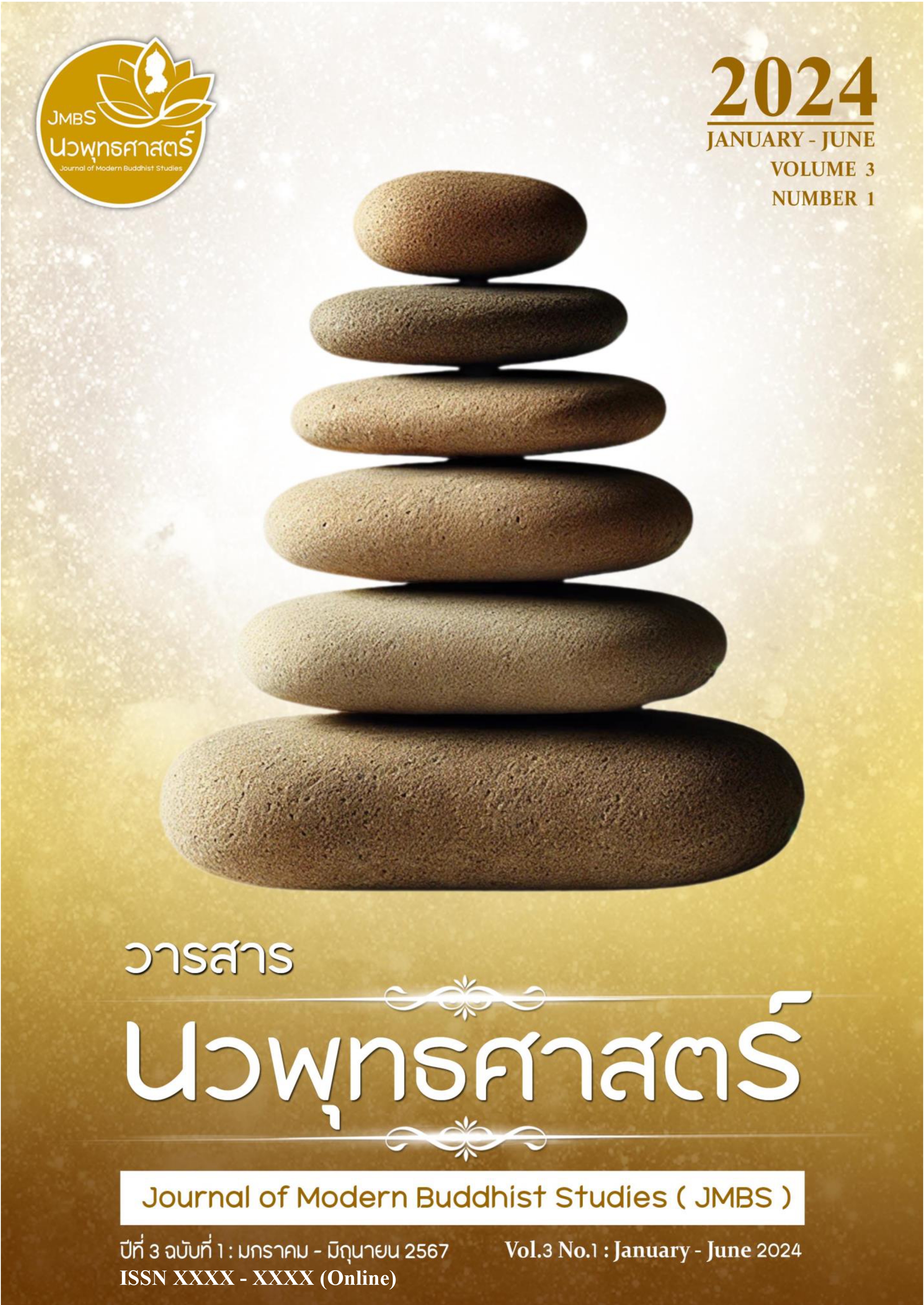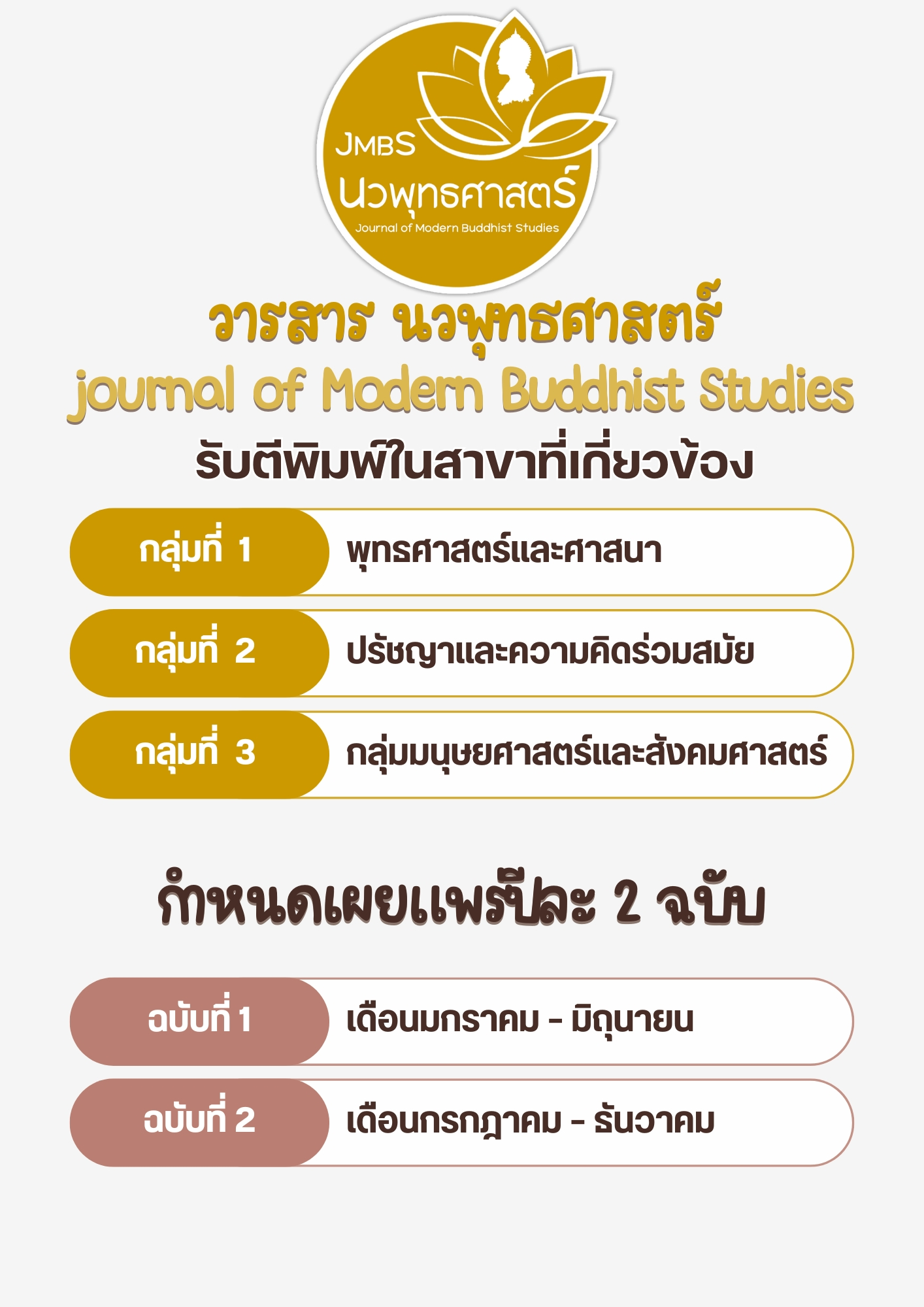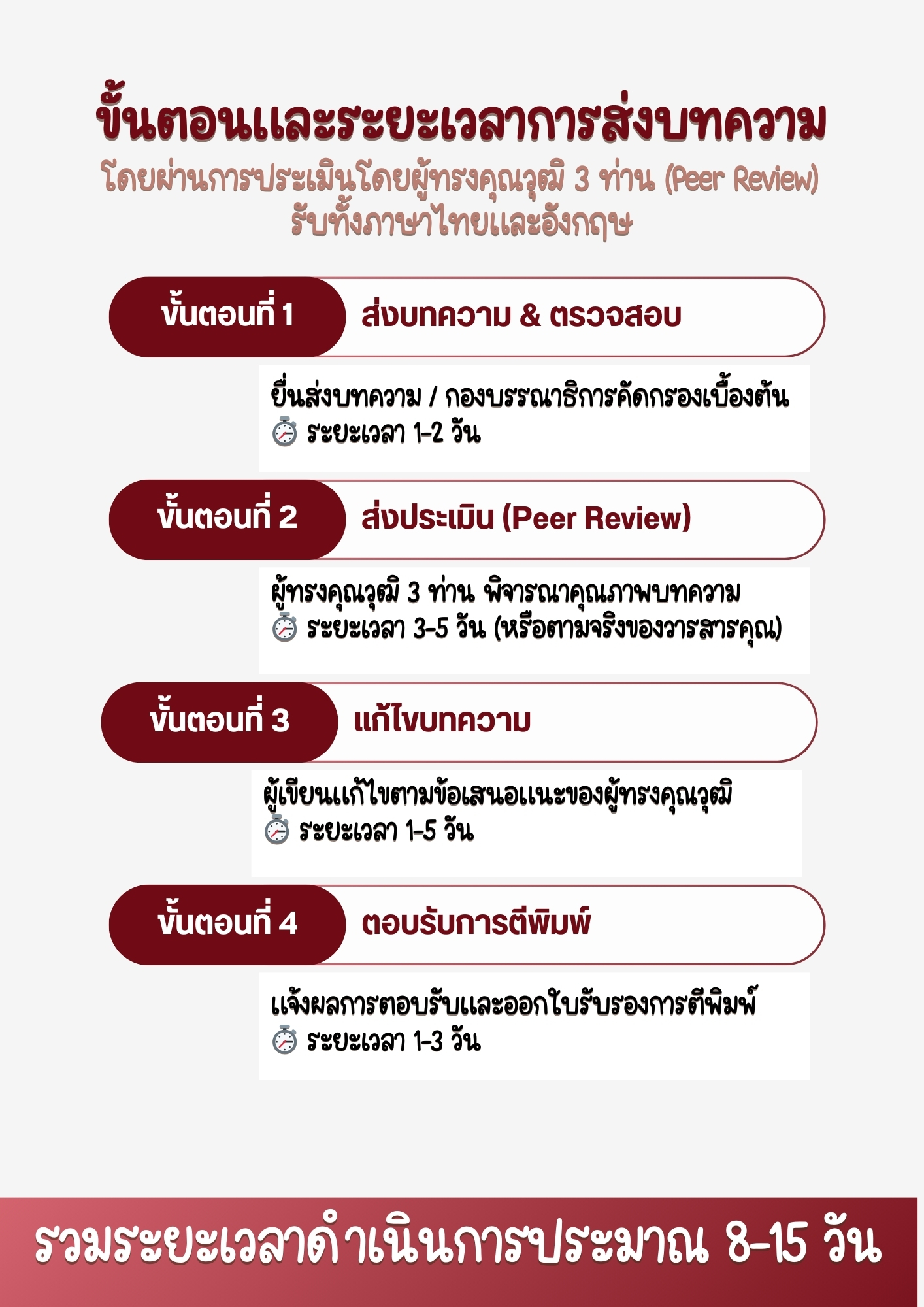BUDDHIST MANAGEMENT MODEL: ORGANIZATIONAL PARTICIPATION
Keywords:
Model, Buddhist Administration, Organizational ParticipationAbstract
The participation of human society should reflect compassion and social responsibility. The development of life and work skills is important, which Buddhist management can be used to develop organizations in terms of quality, morality and happiness. Human resource development should focus on training and enhancing skills appropriate to the target group. Continuous improvement, verifiable structural relationships and the identification of rational mechanisms are important. Participatory management has received attention in the present era, especially the application of good governance principles to reduce conflicts in organizations and create engagement with personnel. Participation means giving people the opportunity to participate in learning and expressing opinions in decision-making on important issues. The use of Buddhism with public participation, using the principle of aparihaniyadhamma, to create unity, cooperation and fairness, which helps to strengthen bonds and responsibilities in the community and reduce conflicts. The Buddha emphasized that parents should be good and moral people. Applying this principle helps to solve communication problems, allows members to work together happily, and creates unity and solidarity in the family and society.
References
กรมส่งเสริมการปกครองส่วนท้องถิ่น. (2552).คู่ มือการจัดทำแผนพัฒนาท้องถิ่น แผนยุทธศาสตร์การพัฒนา แผนพัฒนาสามปี และแผนการดำเนินงาน. กรุงเทพมหานคร: กรมส่งเสริมการปกครองส่วนท้องถิ่น.
สำนักงานคณะกรรมการกองทุนหมู่บ้านและชุมชนเมืองแห่งชาติ (2546). (สำนักงานสภาสถาบันราชภัฏและทบวงมหาวิทยาลัย.
สำนักพัฒนาระบบ รูปแบบและโครงสร้าง กรมส่งเสริมการปกครองส่วนท้องถิ่น (2567). [ออนไลน์]. แหล่งที่มา:https://www.dla.go.th/servlet/TemplateOrganizeServlet?organize=structure
สำนักงานเลขาธิการสภาผู้แทนราษฎร(2560). การมีส่วนร่วมทางการเมืองของประชาชน. กรุงเทพมหานคร : สำนักการพิมพ์สำนักงานเลขาธิการสภาผู้แทนราษฎร.
สำนักงานคณะกรรมการพัฒนาการเศรษฐกิจและสังคมแห่งชาติ สำนักงานนายกรัฐมนตรี. (2554). แผนพัฒนาเศรษฐกิจและสังคมแห่งชาติ ฉบับที่ 11 (พ.ศ. 2555-2559). กรุงเทพมหานคร: สำนักงานคณะกรรมการพัฒนาเศรษฐกิจและสังคมแห่งชาติ สำนักงานนายกรัฐมนตรี.
สัญญา สัญญาวิวัฒน์,ชาย สัญญาวิวัฒน์. (2550). การจัดการทรัพยากรมนุษย์แนวพุทธ การบริหารจัดการแนวพุทธ. กรุงเทพมหานคร : โรงพิมพ์แห่งจุฬาลงกรณ์มหาวิทยาลัย.
ราชบัณฑิตยสถาน (2546). พจนานุกรมฉบับราชบัณฑิตยสถาน พ.ศ. 2542. กรุงเทพมหานคร : นามมีบุ๊คส์พับลิเคชั่นส์.
รัตนะ บัวสนธ (2552). การวิจัยและพัฒนานวัตกรรมการศึกษา. กรุงเทพมหานคร : คำสมัย.
พระพรหมคุณาภรณ์ (ป.อ. ปยุตโต) (2553). ธรรมนูญชีวิต. พิมพ์ครั้งที่ 122. กรุงเทพมหานคร : โรงพิมพ์บริษัท สหธรรมิก.
พระครูสมุห์สนิทวงศ์ วุฑฺฒิวํโส (2567). 4 มาตรการบริหารความเสี่ยงขององค์กรพุทธกับการเผยแผ่ในโลกยุคผันผวน. วารสาร มจร พุทธปัญญาปริทรรศน์. ปีที่ 9 ฉบับที่ 2
พระสมุห์นพดล อตฺถยุตฺโต (2567). ความรับผิดชอบต่อสังคมในการสร้างจิตสำนึกในการท่องเที่ยวเชิงวัฒนธรรม. วารสาร เสียงธรรมจากมหายาน. ปีที่ 10 ฉบับที่ 1
พระพรหมบัณฑิต (ประยูร ธมฺมจิตฺโต) (2539). คุณธรรมสำหรับนักบริหาร. กรุงเทพมหานคร: มูลนิธิพุทธธรรม.
ชาญชัย อาจิณสมาจาร (2540). ศัพท์การบริหารการศึกษา. กรุงเทพมหานคร : ไทยวัฒนาพานิช.
ธีรวุฒิ บุญยโสภณ และ วีระพงษ์ เฉลิมจิระรัตน์ (2534). องค์การและการจัดการ. กรุงเทพมหานคร: อักษรปริทรรศน์.
ธีระพล อรุณะกสิกร และคณะ (2542). ระเบียบสำนักนายกรัฐมนตรีว่าด้วยการสร้างระบบบริหารกิจการบ้านเมืองและสังคมที่ดี. กรุงเทพมหานคร: สำนักพิมพ์วิญญูชน.
ธงชัย สันติวงษ์, องค์การและการบริหาร (2537). พิมพ์ครั้งที่ 9. กรุงเทพมหานคร: ไทยวัฒนาพานิช.
นิพนธ์ กินาวงศ์, หลักการบริหารการศึกษา (2543). พิษณุโลก: ภาควิชาการบริหารและพัฒนาการศึกษา คณะศึกษาศาสตร์ มหาวิทยาลัยนเรศวร.
นายกนก แสนประเสริฐ (2567). หลักการบริหารงานสมัยใหม่กับหลักการบริหารงานเชิงพุทธศาสตร์ เพื่อความมั่นคงแห่งพระพุทธศาสนา. [ออนไลน์]. แหล่งที่มา: https://nsn.onab.go.th/th/content/category/detail/id/109/iid/645.
พิทยา บวรวัฒนา (2546). การบริหารเชิงบูรณาการ. นนทบุรี: สำนักงานข้าราชการพลเรือน.
มัลลิกา ต้นสอน (2544). การจัดการยุคใหม่. กรุงเทพมหานคร: เอกซเปอร์เน็ท จำกัด.
รุ่ง แก้วแดง (2547). โรงเรียนนิติบุคคล. กรุงเทพมหานคร: วัฒนาพานิช.
วิจารณ์ พานิช (2555). วิถีสร้างการเรียนรู้เพื่อศิษย์ในศตวรรษที่ 21. กรุงเทพมหานคร: มูลนิธิสดศรีสฤษดิ์วงค์.
วิทยาลัยการพัฒนาการเมืองท้องถิ่น สถาบันพระปกเกล้า (2555). รางวัลพระปกเกล้า’ 55 (KPI Awards). พิมพ์ครั้งที่ 1. กรุงเทพมหานคร: ธรรมดาเพรส จำกัด.
เสรี พงศ์พิศ (2552). แนวคิดแนวปฏิบัติ ยุทธศาสตร์พัฒนาท้องถิ่น. พิมพ์ครั้งที่ 2. กรุงเทพมหานคร: สำนักพิมพ์พลังปัญญา.
สโรช สันตะพันธุ์ นิติศาสตร์บัณฑิต (2567). พระพุทธศาสนากับหลักพื้นฐานกฎหมายมหาชน. [ออนไลน์]. แหล่งข้อมูล: http://www.panyathai.or.th/wiki/index.php.
ความรู้พระพุทธศาสนาเพื่อการพัฒนาตนเอง (2567). [ออนไลน์], แหล่งข้อมูล: https://kalyanamitra.org/th/article_detail.php?i=15410.
Bardo John W. (1982). and Hartman, John J, Urban Soclogoy : A Systematic Introduction, (U.S.A. :F.E. Peacock Publishers, Inc, (1982). pp. 70-71.
Tosi. Henry L. and Carroll. Stephen J. (1982). Management. 2nd edition. New York : John Wiley &Sons.
Stoner. A. F. & Wankel. C. (1986). Management, 3rd ed. New Delhi: Prentice – Hill Privated.
Willer. D. (1986). Scientific Sociology: Theory and Method. Englewood cliff. NJ.: PrenticeHill.
Keeves, P.J (1988). Educational research methodology, and measurement: An international handbook, (Oxford, England : Pergamon Press.
Schwirian. (1982) Bardo. I. & Hartman. J. J. Urban society: A systematic introduction. New York: F. E. Peacock.
Earwin William(1976). Participation Management: Concept, Theory. and Implementation. (Atlanta, GA: Georgia State University.
Reeder William W. (1974). Some Aspects of the Informal Social Participation of Families in New York State. Ph.D. Dissertation. Cornell University.
White, Alastair T. (1982). Why Community Participation?: A Discussion of the Argument. Go. Community Participation: Current Issue and Lessons Learned. (United Nations Children’s Fund.

Downloads
Published
How to Cite
Issue
Section
License

This work is licensed under a Creative Commons Attribution-NonCommercial-NoDerivatives 4.0 International License.







